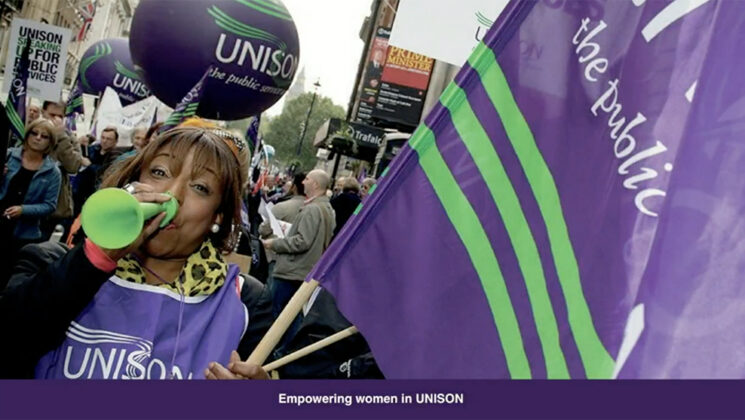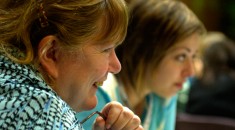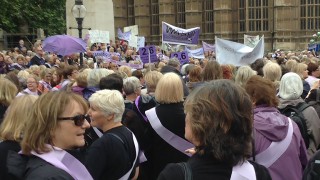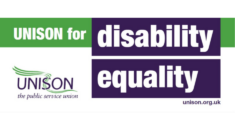UNISON’s annual women’s conference kicked off virtually this morning with a series of debates about raising women’s voices in their union and in the workplace, increasing their participation and involvement in decisions that affect their working conditions.
Chairing the first session was vice chair of the national committee, Deborah Yapicioz from Northern Ireland, who took the opportunity to share facts about women workers whenever there was a break in proceedings for digital voting to take place, starting after Sharon Foster had (successfully) moved the annual report.
The first motion of the day saw Sophie Robinson for the North Cumbria Northumberland and Tyne & Wear health branch open by inviting all delegates to join her branch in using International Women’s Day on 8 March to campaign to #BreakTheBias and share a crossed-arms signal to display support.
With approximately 80% of UNISON’s membership being female, it is “a union built on the power of women”, she continued. But there are still barriers in place that hold back grassroots women in the organisation – not least the unpaid caring responsibilities that still fall predominantly on the shoulders of women.
One of the ways that the union can break these barriers, she explained, is to increase training and mentoring at grassroots branch level.
Sylvia Sharkey for City of Wolverhampton local government, called on the national committee to work with the national Black members’ committee to increase the involvement of Black women.
Elizabeth Cameron, for the national women’s committee, also emphasised that there are layers of discrimination and misogyny, stressing the need to recognise “the value of lived experience”.
Kathleen Kennedy added “100 per cent support” for the motion from Aberdeenshire branch.
For the Northern Ireland committee, Helen Crickard talked of the importance of confidence. In a previous career, she had been a joiner and seen that “men have confidence to do things even when they can’t do them”.
For the North Cumbria Northumberland and Tyne & Wear health branch, Phina Nwoye moved a motion on the need for a greater voice for part-time workers, telling conference that it needed to “send a loud and clear directive” to tell the union’s committees to tackle this.
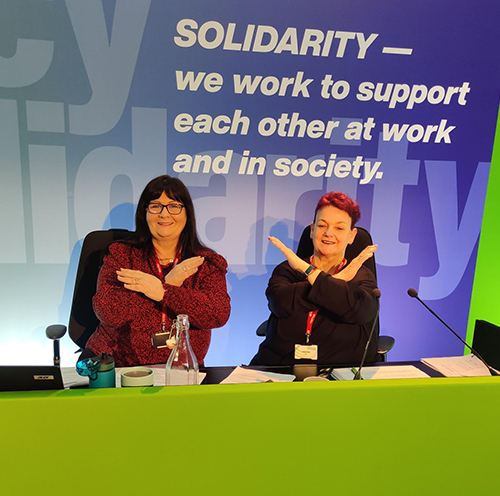
Vice chairs Deborah Yapicioz and Tania Earnshaw make the #BreakTheBias sign
Rosie MacGregor from the retired members’ committee also stressed that, given caring responsibilities, including “caring for the home, a woman’s work is never done” and it is inevitable that part-time work is dominated by women.
She noted too that part-time work has a detrimental effect on pensions.
Pat Heron from the Northern region’s women’s network welcomed the discussion, as “the UK has one of the highest rates of part-time work in Europe; 38% of women are part-time workers, compared to 13% of men”.
She told delegates of her own experience of having to reduce her hours and finding that, as a part-time activist in UNISON, she was a rarity.
“We are lionesses … let’s hear us roar!”
Moving a motion on proportionality – Don’t forget about us when we’re not in the room – for the national Black women’s committee, Bev Miller said that “UNISON can only be strong, vibrant and effective, when we all work together”, asserting that “too many branches and regional structures” don’t have proportionate representation.
Among a range of measures that delegates overwhelmingly backed, conference called on the national committee to:
- work with the union’s learning and organising services on developing training directed at part-time workers;
- work with committees across the organisation to review structures at regional and branch level and create a report on proportionality;
- conduct a survey to help show the barriers and constraints that part-time women workers face that stop them being or becoming an activist;
- support branches and regions with how to achieve proportionality in all areas;
- report back to next year’s women’s conference on progress on the issue of proportionality.

